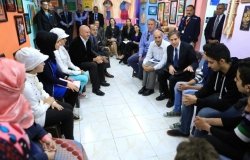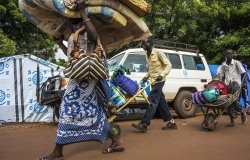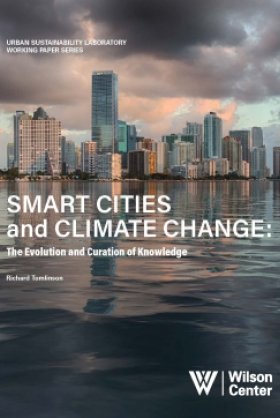The Shelter, Land, and Urban Management (SLUM) Assistance Act, 2009
Rep. Brad Miller, N.C., 13th District; Rep. David Price, N.C., 4th District; Peter Kimm, Chairman of the Board, International Housing Coalition; Christopher W. Williams, Rep., UN-HABITAT, Washington, D.C.
Overview
As the world urbanizes, much of the growth in urban areas is taking place in large, self-built districts. These informal settlements are global phenomena and present unique challenges to those working to address issues of poverty, access to basic amenities, and healthcare in the developing world, yet so far have been addressed only on the local level. The need to reform American foreign aid policies to take into account these changes and greater integration of programs to more holistically address the issues of these informal settlements were the focus of a panel discussion hosted by the Comparative Urban Studies Project at the Wilson Center on May 6, 2009, "The Shelter, Land, and Urban Management Assistance Act, 2009".
Brad Miller, the U.S. Representative from North Carolina's 13th District introduced the Shelter, Land, and Urban Management Assistance Act (SLUM Act) in the hopes that it would be incorporated into a larger American foreign aid reform act. Given the growing number of people living in informal settlements such as Kibera in Nairobi, Kenya, urban poverty in the developing world needs to become more of a focus of the United States' foreign policy.
"The most impoverished parts of the world are urbanizing most quickly and that needs to become more and more of a focus of our foreign policy."
In addition to the health problems caused by not only high population but also high density levels, Rep. Miller drew particular attention to the issue of land tenure, or the lack of property rights in Kibera and other communities like it. The lack of residents' title to the land their houses sit on means "There's absolutely no incentive to improving living conditions if you cannot be assured that you will continue to stay there."
David Price, the U.S. Representative for North Carolina's 11th District and signatory to the SLUM Act, echoed Rep. Miller's statement that American foreign aid needs to take into greater consideration the urbanization of the world's population and corresponding growth in urban poverty.
"Our current array of foreign aid programs is ill suited to confront the challenge of urban slums. These programs often take on the challenge piecemeal; they may take on water access or public health. Such efforts are critical but...a more robust and a more integrated approach is called for if we can figure out how to bring that about."
Rep. Price emphasized the importance of integrated, holistic solutions to inter-connected concerns of "sanitation, public health, access to public transportation, employment, secure tenure, adequate housing, environmental degradation, ethnic conflict" that are both "cause and consequence" of informal settlements.
In addition to greater integration among American aid programs' responses, Price called for openness to incorporating local solutions into American aid programs as well as funding international organizations with greater previous experience in serving these communities.
Peter Kimm, the Chairman of the Board of the International Housing Coalition, also discussed the difficulty of making meaningful progress in addressing the poverty-related challenges of informal settlements when current programs split along lines of specific aspects of poverty with no coherent or unifying strategy.
Kimm also raised the importance of the relationship between urban development and economic growth, saying, "Good management of the cities including good management of the slums is just an important feature of economic growth and urban development."
Improving the influence of the United States on the issue of housing, specifically in informal settlements, is vital for Kimm. He believes that a revamping of the existing USAID program can be the primary means by which the US regains some of the international influence it had in poverty alleviation in decades past and help bring about a coherent, unified strategy to addressing these issues.
Christopher W. Williams from UN-HABITAT's Washington DC Office emphasized the importance of a long-term perspective on addressing the issues of informal settlements.
"What kind of legislation can transcend changes in administration, what can be put in place that's a longer term strategy for dealing with this because we are...looking at about 2 billion people that are going to be living in slums by the year 2030?"
Echoing earlier speakers, Williams stated, "The magnitude of the problem is so enormous that it's not something that I think is going to be captured in a one off-project, it's systemic change." Therefore, the intent to root the SLUM Assistance Act within a broader goal of foreign aid reform is important to its success.
Williams concluded by raising the question of who, exactly, is the constituency for an issue such as informal settlements. He proposed several possibilities:
• The business community because of its increasing recognition of the market potential of members of informal settlements who currently do not have access to their products.
• The post-conflict/post-disaster community already has programs and experience in dealing with challenges very similar to those confronting the growth in self-built urbanization, such as Afghanistan Aid.
• Exchange programs would give America's city leaders the opportunity to pass on their expertise to leaders of the world's developing cities.
Overall, in order to get informal settlements the attention they need and deserve, outside-the-box thinking is needed when considering who the constituency for these issues could be.
Hosted By

Urban Sustainability Laboratory
Since 1991, the Urban Sustainability Laboratory has advanced solutions to urban challenges—such as poverty, exclusion, insecurity, and environmental degradation—by promoting evidence-based research to support sustainable, equitable and peaceful cities. Read more
Thank you for your interest in this event. Please send any feedback or questions to our Events staff.









